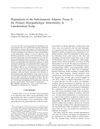Lipedematous Alopecia: An Uncommon Clinicopathologic Variant of Nonscarring but Permanent Alopecia
May 2008
in “
International Journal of Dermatology
”
TLDR Lipedematous alopecia causes permanent hair loss due to increased scalp fat.
The document described a case of lipedematous alopecia in a 52-year-old black woman who experienced gradual scalp swelling and slowed hair growth over 5 years, primarily affecting the vertex and parietal regions. The condition was characterized by diffuse hair thinning, a spongy scalp texture, and a lack of scalp inflammation or increased hair fragility. A CT scan revealed thickening of the subcutaneous fatty tissue, and a biopsy showed a significant increase in subcutaneous fat with a loss of hair follicles, replaced by fibrous tracts. The study concluded that lipedematous alopecia is a nonscarring but permanent form of alopecia, with the primary histopathologic feature being the thickening of subcutaneous fatty tissue.



